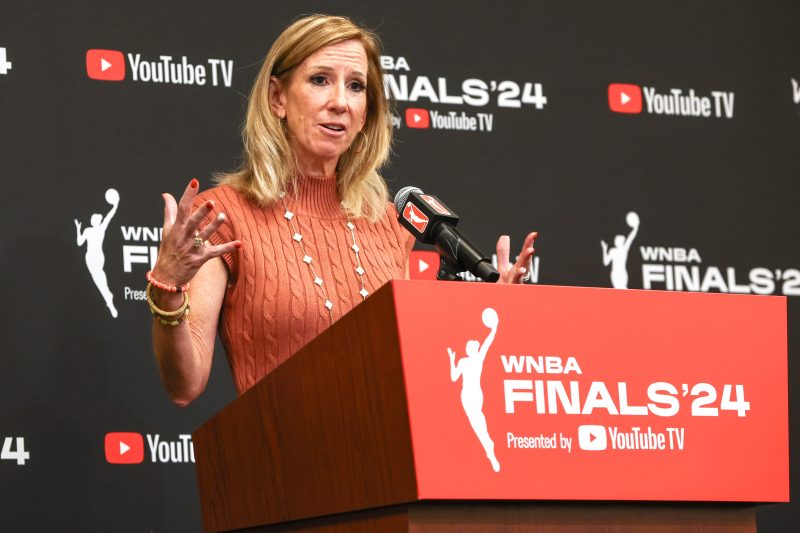BROOKLYN, NEW YORK — The WNBA is more popular and in demand than ever, Commissioner Cathy Engelbert said Thursday before Game 1 of the Finals between the New York Liberty and Minnesota Lynx — and she says the league is prepared to meet that demand.
Starting in 2025, the WNBA Finals will switch to a best-of-seven game series, increasing from the best-of-five game format. The home-away format will follow the NBA, with 2-2-1-1-1, with the higher-seeded team maintaining home-court advantage.
“This will give our fans a championship format that they are accustomed to seeing in other sports,” Engelbert said.
Additionally, the first round, which is a best-of-three game series, will switch to a 1-1-1 format, guaranteeing all playoff teams will host at least one game. This will be a financial boon to teams like Indiana, which sold out numerous games this season behind excitement around Caitlin Clark but had to go on the road to Connecticut for its only two playoff games.
The WNBA will play 44 regular-season games next season, the most for the 28-year-old league. The 2025 season does not have international competition next year with neither Olympic nor World Cup events scheduled. Engelbert said “we all want to grow the game globally … which is why most of what we’re doing is expanding our season on the backend,’ a nod to the increased playoff games.
The WNBA is set to expand starting next season: Golden State will begin play in 2025 and Toronto and Portland in 2026. Engelbert said the plan is still to get to 16 teams total, which means there’s one more expansion team to come. Engelbert said the goal is to have that team playing by no later than 2028.
Related to expansion, the league announced that Golden State will pick fifth in each of three rounds of the 2025 draft. The draft lottery will take place Nov. 17 to determine the order of the first four picks (Los Angeles, Dallas, Chicago and Washington are the teams in the mix for the lottery).
Engelbert rattled off numbers at the beginning of her news conference to demonstrate the growth of the league. She mentioned significant spikes in viewership, attendance, digital engagement and merchandise sales, and specifically called out the league reaching a record 54 million viewers this season, hitting 1 million WNBA app downloads and experiencing nearly a 300% jump in social engagement, among other metrics.
“Younger, more diverse audiences are imperative to the growth of the sports industry, and they flocked to the WNBA this season. Viewership by fans under 35 increased by 211%, led by a 259% increase by Gen Z and Millennial women,” Engelbert said.
But she also acknowledged that “the growth has not come without growing pains,” a nod to the troubling trend of numerous players across the league suffering online harassment.
Asked if anything can be done to quell the online harassment, Engelbert said the league is exploring some potential “technology solutions,” and plans to talk more with players and the Players’ Association about a game plan for dealing with online hate.
Engelbert has also been in conversations with players and the Players’ Association about the looming Nov. 1 deadline for players to opt out of the current Collective Bargaining Agreement. If players decide to opt out, negotiations would start at the end of next season.
Whether or not they opt out, Engelbert said, everyone has the same goal: “Take this league to the next level for generations to come.”
